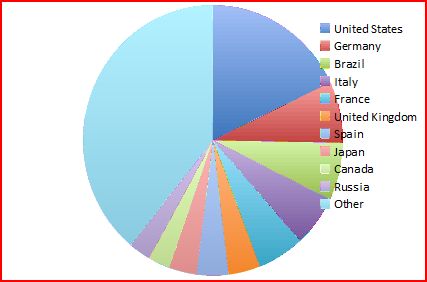Open Source Adoption in Italian Public Administrations: Some Real Cases
As mentioned in a previous post, ForumPA - the greatest Italian event of and about Public Administration – asked me to chair the only open source conference taking place in the event.
Italian and international speakers provided the audience with an insight into how to effectively deploy open source software in a significant way.
I opened the conference talking about the Italian scenario for the open source sector, and I started by showing the audience some SourceForge download numbers. Italy is the fourth country in the world for open source software downloads. Italy was used to be the third, but the impact of open source in Brazil is higher now.
SourceForge Global Traffic Distribution (April 2009), courtesy of SourceForge
Despite many Italian regional laws are in favor of open source software, the Italian open source offering is still lacking in many respects (market’s dimension, lack of inter firm relationships, inability to fulfill vertical market requirements).
Beyond its ‘freeness’, open source is also a powerful weapon to share costs and risks, but value co-creation demands governance. I mentioned also issues like the promotion of local development, community management and how to tap into existing ones, inviting speakers to share with their experiences and show their ways.
Gijs Hillenius (OSOR)Â provided insights on open source adoption in Europe, bringing many case studies and introducing the audience to the EUPL license and OSOR open source procurement guidelines.
Marco Gentili (National Center for ICT in Public Administrations) gave a speech explaining nuts & bolts of IT procurement, covering what could strategically lead to easier open source adoption.
Carlo Vaccari (Italian National Institute of Statistics) maked clear why moving to open source leads to increased cooperation inside public administrations. RELAIS (REcord Linkage At IStat) is an open source toolkit to identifiy if two or more records represent the same real world entity (record linkage). The RELAIS toolkit is composed by a collection of techniques for each record linkage phase that can be dynamically combined in order to build the best record linkage workflow, given a set of application constraints and data features provided as input (see also OSOR’s news item).
Roberto Resoli (Municipality of Trento) told the audience about Trento’s VoIP project, one of the many infrastructures moved to open source software. (see also OSOR’s news item). Roberto is also the mantainer of j4sign, a project aimed at providing a software layer for digital signature. He recently started a new project on OSOR forge to write an OpenOffice.org extension to digitally sign ODF 1.2 document according to the national signature standards.
Bud Bruegger‘s (Ancitel) speech “To have or to make” detailed an hands-on experience on how public administrations can create and foster an open source community. The municipality of Grosseto [his former employer]Â going open source saved big money, but by failing to sustain their key staff the success may turn into a liability.
Osvaldo Gervasi (Umbria Open Source Competence Center) explained the Umbria region approach to “open source adoption and disseminations by PAs“. The micro-funds model in 2007 sponsored 5 projects spending 100.000 euros, 46 projects were approved in 2008 spending 235.000 euros, showing the audience how small money can make a difference (while sometimes big companies getting big money for R&D lack of concrete results, see the EC funded project QualiPSo).
Michele Marchesi (University of Cagliari and FlossLab) brought the experience of an open source start-up born thanks to regional funds. While apparently the original idea was to fork Alfresco, they ended by integrating Alfresco with other platforms and doing other stuff with Agile technologies.
Sun, Novell and Microsoft gave also interesting speeches, ranging from StarOffice/OpenOffice.org roadmap, to the Suse Linux appliance construction kit and some CodePlex projects (AJAXControlToolkit, DotNetNuke and WPF).
Luigi Vimercati stepped by the conference to briefly tell the audience about his bill ‘Network neutrality, free software and society‘, a bill aimed at addressing a pretty high numer of issues.
Beyond laws and rules, panelists have been the living proof that open source adoption by public administrations is a process.  Open Source governance - of which open source procurement is part along with open source software selection - shouldn’t be a list of case studies of excellence, and requires care to be achieved and education to be appreciated.


Open Source Adoption in Italian Public Administrations: Some Real Cases | Linux Articles 4:11 pm on June 6, 2009 Permalink
[…] original post here:Â Open Source Adoption in Italian Public Administrations: Some Real Cases Tags: area, audience-some, chair-the-only, conference, event, greatest, help-other, news, open, […]
GoblinX Project » GoblinX Newsletter, Issue 203 (06/07/2009) 7:24 pm on June 7, 2009 Permalink
[…] Open Source Adoption in Italian Public Administrations: Some Real Cases […]
Links 07/06/2009: More Migrations to GNU/Linux in Schools, Shop | Boycott Novell 1:34 am on June 8, 2009 Permalink
[…] Open Source Adoption in Italian Public Administrations: Some Real Cases I opened the conference talking about the Italian scenario for the open source sector, and I started by showing the audience some SourceForge download numbers. Italy is the fourth country in the world for open source software downloads. Italy was used to be the third, but the impact of open source in Brazil is higher now. […]
Open Source — The Spread | 7:05 am on June 16, 2009 Permalink
[…] Ever wondered which countries use Open Source? Well wonder no more. Head over here for a look at what is happening with Open Source. […]
Zubair Siddique 6:47 am on November 4, 2010 Permalink
That was very informative and well written. Mentioned below is an excerpt of an article on Open source software:
“Open source has today become a necessity for most businesses. It is estimated that 99 percent of all companies using software use atleast one open source component. The business value added by open source products makes them inevitable for every company. In addition to software, open source has today expanded its tentacles to many areas from open text books to open drug discovery and is fast spreading to other areas……to read more please visit http://www.sinapseblog.com/2010/10/open-source-business-reality.html“